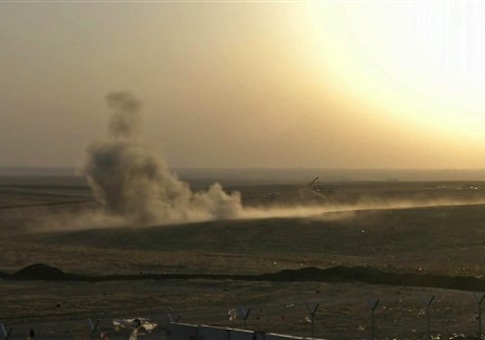President Barack Obama has missed a key opportunity to deliver a blow to Islamic militants in Iraq by authorizing only limited airstrikes, making it more difficult to combat the security threat posed by the jihadist group, a leading military expert said on Thursday.
Obama ordered airstrikes and airdrops of food and water in recent days to prevent the Islamic State of Iraq and the Levant (ISIL or ISIS) from slaughtering Yazidi minorities trapped atop Mount Sinjar in northern Iraq. Defense officials said on Wednesday that U.S. aid had helped Kurdish pesh merga fighters break ISIL’s siege of the mountain and lead thousands of Yazidis to safety.
However, one U.S. defense expert said the limited air campaign had provoked a change in ISIL’s behavior. Rather than operating like an army with conventional formations as the group had done previously, the militants are now acting like insurgents and mixing in with civilians.
"There was a long period when the Islamic State was operating in the open, was maneuvering relatively larger formations, was maneuvering vehicles, and was operating like a conventional force," said Frederick Kagan, director of the American Enterprise Institute’s (AEI) Critical Threats Project, during an online event. "It presented us with a lot of targets that we probably could have hit from the air."
Now the jihadists are blending in with the civilian population, making them much more difficult to target. Kagan noted recent comments by Lt. Gen. William Mayville Jr., director for operations with the Joint Chiefs of Staff, that the U.S. airstrikes "are unlikely to affect [ISIL’s] overall capabilities or its operations in other areas of Iraq and Syria" and that they are not "somehow breaking the momentum of the threat."
"This manner of dropping a couple bombs at a time has had the effect of telling ISIS that they need to go to ground, they need to disperse, they need to stop operations," Kagan said. "In other words, we’ve basically told them that they need to hide from us—which they are doing."
The minimal strikes reveal a deeper deficiency in the Obama administration’s approach to fighting ISIL, said Kagan, who was previously the architect of the surge strategy in the Iraq War. U.S. officials seem prepared to accept that ISIL could control large swaths of territory in eastern Syria and northern Iraq—a base of operations from which the terrorist group could launch attacks on the U.S. homeland.
"You could decide that the cost of preventing that from happening is too high, and we really do need to just contain and mitigate this al Qaeda state," he said. "But that’s such a transformation in, first of all, this administration’s stated position on what we’re doing to al Qaeda, and second of all, our overall strategy of the last decade of what we think we’re doing to al Qaeda."
"It’s something we probably ought to all talk about," he added.
Top U.S. lawmakers and officials continue to identify ISIL as the gravest national security threat since the Sept. 11, 2001, terrorist attacks.
Obama appeared to dismiss any indication on Thursday of employing a more robust strategy against ISIL, stating that the "majority of the military personnel who conducted the assessment [near Mount Sinjar] will be leaving Iraq in the coming days."
"We will continue airstrikes to protect our people and facilities in Iraq," he said. "We have increased the delivery of military assistance to Iraqi and Kurdish forces fighting ISIL on the front lines."
Any successful U.S. strategy against ISIL will need to incorporate disaffected Sunni tribes, Kagan said. The tribes, a central part of U.S. forces’ success against al Qaeda in Iraq in previous fighting, were alienated by what they say was former Prime Minister Nouri al-Maliki’s sectarian leadership.
Maliki stepped down on Thursday to make way for Prime Minister-designate Haider al-Abadi. He had previously refused to relinquish power, threatening a constitutional crisis in Baghdad as Iraqi forces battle ISIL.
Better outreach to the Sunnis would likely require more U.S. special operations forces on the ground in Iraq, a move Obama has so far resisted.
Michael Rubin, an AEI resident scholar and former Pentagon adviser on Iran and Iraq during the George W. Bush administration, said he met last month with Sunni tribesmen and former top generals under Saddam Hussein’s regime. They could not believe that U.S. officials had not contacted them, he said.
"Whether we agree with them or not about what the United States should be doing, they were beyond themselves that there’s actually been no communication, or very little communication with them," he said.
